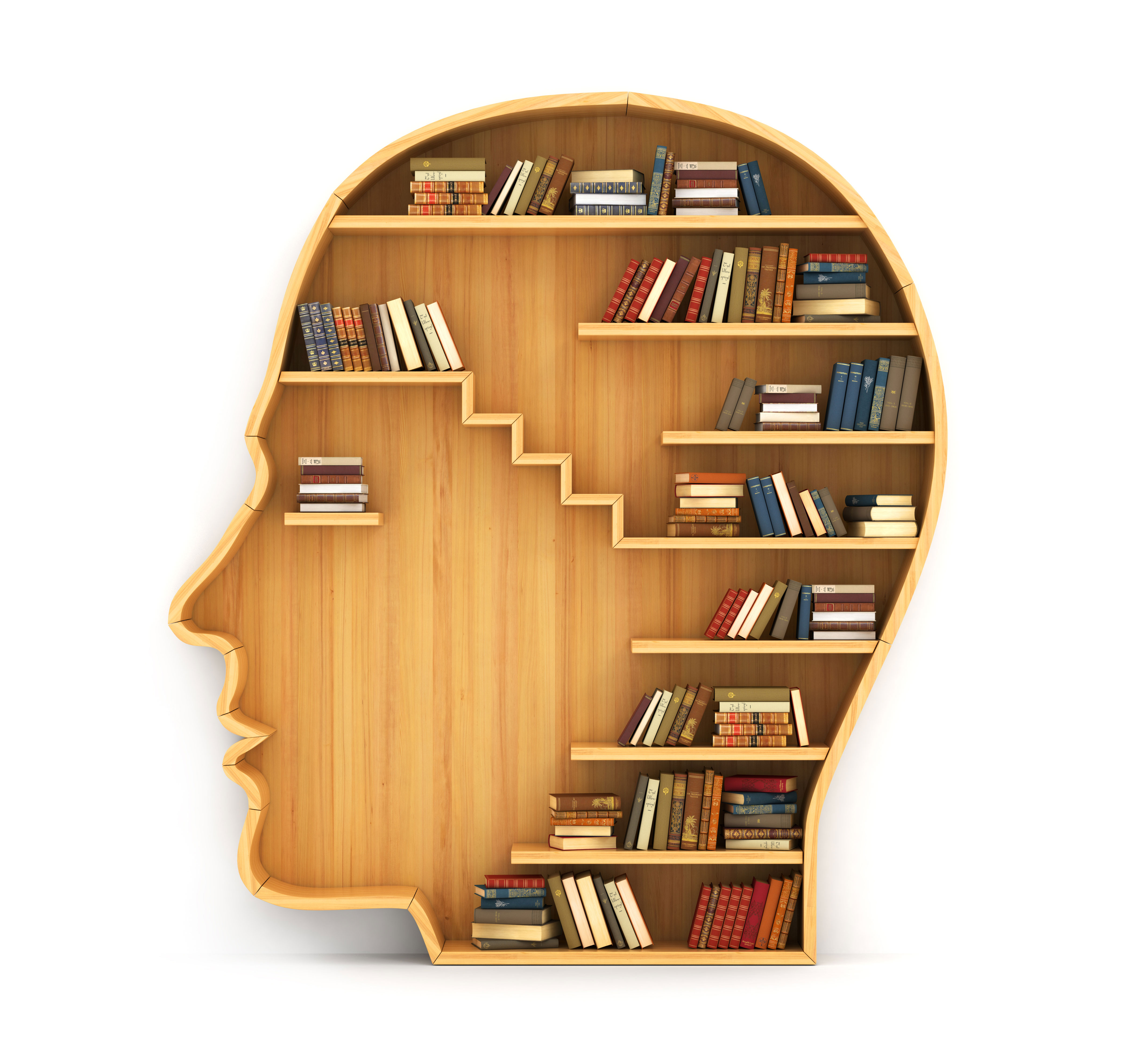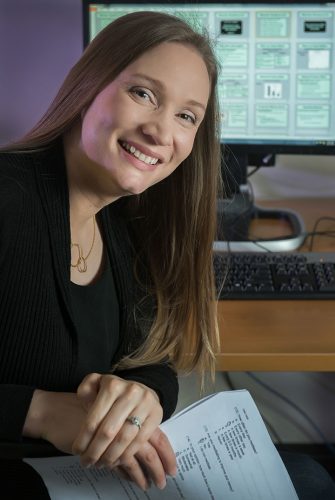Uma Tauber’s Memory Tips
The cognitive psychologist explores how students, workers and the elderly retain information.

Illustration ©GURFINGUSS - Getty Images
Uma Tauber’s Memory Tips
The cognitive psychologist explores how students, workers and the elderly retain information.
Thinking about thinking may sound like an opaque academic pursuit, but Uma Tauber can reel off dozens of applications for metacognition, her field of expertise. Among them: improving learning in schoolchildren and college students, workers and the elderly.
With a new multimillion-dollar grant, the assistant professor of psychology will spend the next five years investigating the most effective strategies to help high school and college students retain key concepts and information.
“It’s easy as a cognitive psychologist to sit in my lab and make recommendations about what students and teachers should do,” said Tauber. “But this research will consider the messier situation of actual student lives and actual educators in order to look at what practices they engage in and what they believe is important for their own learning.”
Such questions dwell at the heart of metacognition, which Tauber, who arrived at TCU in 2013, defines as “your ability to think about your own thoughts.” Throughout her career, Tauber has maintained a particular interest in memory.

Uma Tauber studies the connection between learning and memory. (photo by Glen E. Ellman)
Acing the test – not
“After every exam, I have students come talk to me about how they thought they were going to do really well because they were certain they had learned the information, but they wound up doing poorly and were shocked.”
That disconnect between perception and reality has long fascinated Tauber, as does discovering how to mitigate it.
“I’m very interested in helping students best form their knowledge not only so they can get through college but also to help them develop a sophisticated understanding on a deeper level of the concepts and material, which they can take with them after they graduate,” she said. “The ability to use what you’ve learned in a comprehensive way and apply it in a new context is the gold standard in cognitive psychology.
“For example, as a businessperson you hope you can run your new employee through a training program and have that employee ultimately apply what they’ve learned in different contexts.”
Bad news on cramming
Tauber recommends testing as an effective strategy to enhance learning, particularly for students. “Tests have a very positive influence on learning, and that includes self-testing,” she said. She encourages her undergraduates to use flashcards or challenge themselves to write down what they remember from a lecture, then compare that to the notes they took in class.
For comprehensive exams such as finals, Tauber recommends “distributed practice,” or spacing out studying over days or weeks. “Students often report that they feel like they learn more in one big session, which we call massing but is more commonly known as cramming,” she said. “It may give you some benefit in the short term, but you’re not likely to retain the information in the long run, which is obviously the goal of learning at a university level.”
“This research will consider the messier situation of actual student lives and actual educators in order to look at what practices they engage in and what they believe is important for their own learning.”
Uma Tauber
In November, the James S. McDonnell Foundation awarded a $4.6 million grant to Tauber and five research colleagues from other universities.
To assess student learning as part of the McDonnell Foundation grant, Tauber and her doctoral student, Amber Witherby, will concentrate their research on TCU undergraduates and Fort Worth-area high school students. Tauber’s colleagues at Boston College, the University of Pittsburgh, Iowa State University, the University of Texas at
Austin and Purdue University will run concurrent studies. The researchers and their graduate students plan to meet at least twice a year to share their results.
“The grant will open a lot of doors for us in terms of expanding our research,” said Witherby, a third-year doctoral student in psychology who came to TCU to work with Tauber. “Uma is really a rock star in the field, and the amount of research she does in her lab is astounding.”
In addition to the McDonnell Foundation work, Tauber intends to continue studying elderly people, a focus of her work since she started her master’s degree program at the University of Colorado in Colorado Springs. In the last few months, dozens of healthy volunteers age 65 or older have gone through testing in her Metacognition, Memory and Aging Lab.
“Memory for the elderly can have profound consequences,” said Tauber. “If an older patient thinks he understands what a doctor has told him to do about his diabetes or another diagnosis that requires a lot of management on that individual’s part, it could have serious health consequences if the patient is wrong.”
Grandma’s vocabulary
Tauber said, however, that her investigation into memory and the elderly doesn’t represent “a bleak aging story.” Several types of memory, including semantic, improve with age, she said. “Older adults outperform TCU students on vocabulary tests nearly every time.”
During the fall semester, Meg Jahns, a research assistant in Tauber’s lab, and fellow student Taylor Simons received grants from TCU’s College of Science & Engineering Research Center to fund their work with the older participants.
“The most interesting thing to me is how worried our older participants are about their memory,” said Jahns, a senior psychology and child development major. “When I’m 75 or 80, I hope I’m doing as well as they are.”
Simons, a senior psychology major, became lab manager in the fall. “One of the things that makes the lab so unique is the level of research we get to do as undergraduates,” she said.
“Dr. Tauber brings such passion to everything she does, and she treats all of the students working in her lab like we know what we’re doing.”
Tauber said she missed the day-to-day contact with her students when she took time off from teaching for the birth of her twins, Grant and Lydia, last year.
“My favorite part of my job is the mentoring,” she said. “It’s always very easy to write my students letters of recommendation because they are so sharp and so motivated. I honestly would get very little done without their support.”

Your comments are welcome
3 Comments
My son is a freshman in TCU pre med, and I remember there was a short tutorial on how to read with efficiency and better memory retention, at the beginning last year. I could not find that information any more and I would like help my already stressed son.
Is your department providing this tutoring? I will really appreciate your attention to this matter.
Luis A Rodriguez MD
I WENT TO THE ORIENTATION IN 2016 WITH MY SON, AND I REMEMBER THERE WAS A FREE CLASS OR SEMINAR, OFFERED OVER 3 SATURDAYS, ABOUT HOW TO STUDY WITH TECHNIQUE, APPROPRIATE TO YOUR MAJOR, WITH THE PURPOSE OF LEARNING MORE EFFICIENTLY.
HOWEVER I DO NOT FIND THIS COURSE ANY MORE AND NOW MY DAUGHTER WILL BE A FRESHMAN THIS SUMMER 2018.
COULD YOU PROVIDE WITH SOME INFO ABOUT THIS CLASSES THAT ARE VOLUNTARY TO ATTEND?
The Center for Academic Services offers free individual academic coaching on topics such as time management, effective study strategies, and test preparation throughout the school year. Your daughter can call 817-257-7486 to schedule an appointment with one of the advisors/academic coaches for the fall semester if interested.
Related reading:
Features
Starpoint School’s Special Education
At age 50, the on-campus lab school is still giving students a chance to shine.
Features
Adam Fung’s Uncommon Arctic Adventure
The art professor is acting as an Arctic ambassador and filmmaker after his 19-day residency in the Far North.